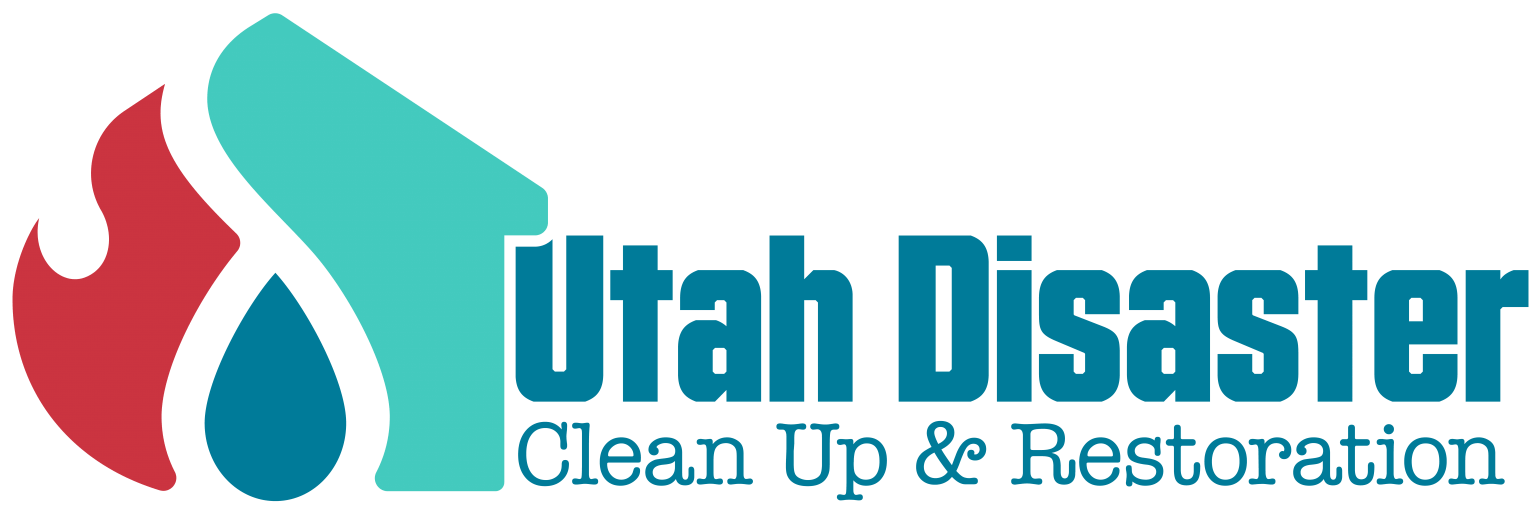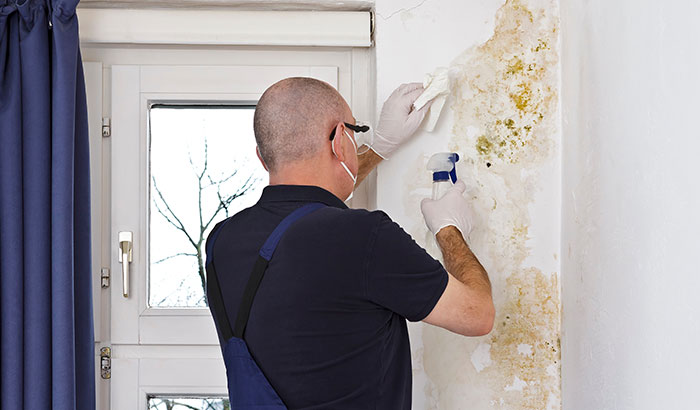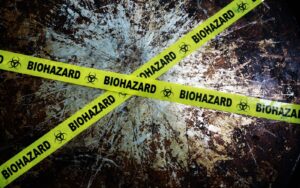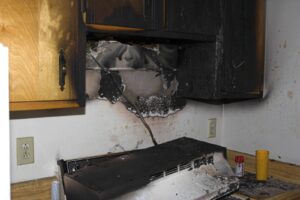Do you suspect that you have been exposed to mold? Perhaps you are wondering if mold exposure can make you sick. The short answer is yes. However, we will guide you through identifying mold growth, understanding where it comes from, the health effects of mold exposure and how to treat them, and the importance of cleaning the moldy area properly.
First, let’s take a look at how to identify mold growth within your home
Visually Inspect for Mold
Look for any visible signs of mold growth. Mold can appear in many different colors and textures, depending on the type of mold and the surface it is growing on. Some common colors of mold include black, green, brown, and white.
- Black mold is one of the most common types of mold found in homes and buildings. It typically appears as a dark or black discoloration on surfaces and can have a musty or damp smell.
- Green mold is another common type of mold found in homes and buildings. It typically appears greenish-black and can be found on surfaces such as walls, ceilings, and flooring.
- Brown or yellow mold can also be found in homes and buildings. It typically appears light or dark brown or yellow and can be found on surfaces such as drywall, wood, or wallpaper.
- White mold typically appears white or grayish and can be found on surfaces such as drywall, wood, or wallpaper.
Next, Identifying Mold Growth
What Does Mold Look Like?
Mold can also appear in different textures, such as slimy, fuzzy, or powdery. It can grow on various surfaces, such as wood, drywall, wallpaper, carpet, and fabrics. It is important to note that not all mold growth is visible. It can grow behind walls, under flooring, and in attics.
Check for Musty Odors
What Does Mold Smell Like?
Mold has a distinct musty or damp smell. The smell can be strong or faint, depending on the amount of mold present and the location of the growth. The smell can also change depending on the type of mold present. Some people describe the smell as earthy, musty, or damp, while others describe it as having a strong, musty odor.
The smell may be more pronounced in areas with high humidity, such as bathrooms, basements, or attics. If you notice a musty smell in your home or building, it may be a sign of mold growth, and it’s important to investigate the source of the odor and address any mold growth as soon as possible.
Where Does Mold Come From?
Look for Signs of Water Damage
Water damage can manifest in various ways, depending on the severity and length of time the water has been present. Here are a few common signs of water damage:
- Visible water – water can be seen pooling on floors, seeping through walls, or dripping from ceilings.
- Stains – water damage can cause discoloration, staining, or warping of wood, drywall, or other building materials.
- Peeling paint or wallpaper – moisture can cause paint or wallpaper to blister, peel, or separate from the walls or ceiling.
- Buckling or warping of floors – water can cause hardwood or other types of flooring to warp or buckle.
- Musty or damp smell – a musty or damp smell can indicate the presence of mold or mildew, which can result from water damage.
- Swelling or bubbling of materials – Water damage can cause materials to expand or blister, such as drywall or wood.
- Rust or corrosion – Water damage can cause rust or corrosion on metal surfaces, such as appliances, pipes, or hardware.
It is important to address water damage as soon as possible, as it can lead to mold growth, structural damage, and potential health hazards.
Common Symptoms Identified With Mold Exposure
- Sneezing
- Runny nose
- Coughing
- Congestion
- Irritation of the eyes, nose, throat, and lungs
- Dry, scaling skin
- Itchy eyes
- Redness and itching of the skin
- Headaches
- Fatigue
- Dizziness
- Nausea
- Impaired immune system function
How to Treat Health Symptoms Associated With Mold Exposure
This is the easy part. If you suspect you have been exposed to mold, it is important to consult a medical professional for an accurate diagnosis. It is important to note that some people may not have any symptoms at all or may have different symptoms.
Treating Mold Growth in Contaminated Areas
Cleaning up mold can be a difficult and potentially hazardous task. It is essential to take appropriate safety precautions and use the proper equipment to ensure that the mold is removed effectively and safely.
Here are five things you’ll need to be aware of while you are cleaning up mold damage
- Wear protective gear.
- Contain the area to prevent the spread of mold spores.
- Remove the mold using a damp cloth or sponge and a mild detergent.
- Dry the area thoroughly to prevent the mold from returning.
- Clean and disinfect all items that have been in contact with the mold.
Although these are helpful tips for cleaning up mold, the best way to rid your home of mold damage is to hire a professional.
Professional Mold Removal is Recommended for Several Reasons
- Safety – cleaning up mold can be dangerous, as it can release mold spores into the air and cause allergic reactions or other health problems. Professionals have the proper equipment and training to remove mold safely and prevent exposure.
- Effectiveness – professionals have the expertise and equipment to remove mold and prevent it from returning. They also know how to properly contain the affected area and prevent the spread of mold spores to other parts of the building.
- Liability – If mold is not cleaned up properly, it can cause structural damage to the building and may not be covered by insurance. Professionals can document the work they do and provide a guarantee that the mold has been removed.
- Time-consuming – cleaning up mold can be a time-consuming process and requires specialized equipment and knowledge. Hiring a professional can save time and ensure the job is done correctly.
- Cost-effective – in some cases, hiring a professional for mold remediation may be more cost-effective rather than trying to clean up the mold yourself. Professionals will have the necessary equipment and can complete the job more quickly and efficiently.
- Specialized knowledge – professionals have specialized knowledge and experience in identifying different types of mold, assessing the extent of the problem, and implementing the proper remediation procedures. They also know how to work with insurance companies and handle legal and regulatory compliance issues.
For these reasons, it is often best to hire a professional mold remediation company if you suspect a mold problem.
Let Utah Disaster Clean Up & Restoration Rid Your Home of Mold and Mold Damage
Contact us today, and let our trained professionals care for your mold remediation. Mold removal will help improve your living conditions and allow you to avoid health effects caused by exposure to mold.



